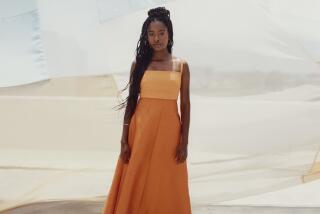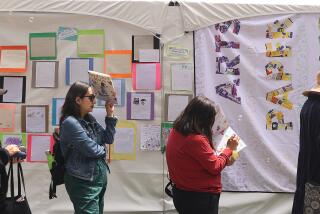New works by poets Jennifer Moxley, Judy Halebsky, Saeed Jones
Jennifer Moxley’s earnest and introspective new poems feel almost like personal essays: They take up questions that vex her in daily life, then try to explain why they won’t go away. Why do “life and death insights / in the classroom / vanish / when pedaling home / with thoughts of food”? Why does Moxley, or other childless adults, find that “the longing for something to protect / ties us up with useless sorrow”? Why does the poet — who teaches at the University of Maine, an hour from the Atlantic — experience “uncanny sadness” on returning to San Diego, where she grew up?
Her answers are tentative and not always surprising: It’s her way of trying to find them that sets her apart. Her unfolding sentences can get almost awkward as Moxley figures out how to say just what she feels, and their intricacies — sometimes elegant, sometimes tangled — show that ideas, beliefs and abstract hypotheses can really change how people behave. She shows her regret, her boredom, her delight, but she also shows herself in the process of changing her mind: She even remembers “defending defunct ideas that changed me as though / they were people in the room I might / unwittingly offend.”
Moxley also reflects, cuttingly, on literary culture: “Strangely, people often give authority to writers who make a big show / of being against it.” She used to be one of those writers. Moxley began in the 1990s avant-garde, writing poems that refused the comforts of prose sense as they attacked the comforts of capitalism.
She is not like that now: “I grow more narrative by the year,” she muses, “saying things to get them said, / feeling no leisure to take old risks.” Meanwhile the avant-garde, or some of it, has become apolitical, or unfeeling, or both: “Poems in recent journals have forgotten / there’s a world.” Her new book — however involuted, however winningly intellective — makes no such mistake.
The Open Secret
Jennifer Moxley
Flood Editions: 96 pp., $15.95 paper
::
Judy Halebsky knows there’s a world out there too, and she uses her short, sensuously vivid poems to show what she has seen and what she has loved: “if this book were a bridge I would trust my weight to it,” she promises. Her resonant lines, with plenty of white space among them (there’s even a poem called “Space, Gap, Interval, Distance”), also reflect what she’s read: the lyrical brevity of Chinese and Japanese classics (Li Po, Basho), the fierce, proud tones of Adrienne Rich (two poems pay homage to Rich by name).
Halebsky left her native Nova Scotia “because there were whole towns without work / houses worth less than the water heater.” She now lives and teaches in Oakland, but she is less concerned to depict Northern California than to imagine the rewards of far-flung travel, in time, in space and amid poetic traditions. Japanese written characters turn up sporadically throughout these pages, an explicit homage to Basho’s haiku. But rather than copy the 17-syllable form, Halebsky makes it into a model for her own resonant stand-alone lines: “there’s a snail who thinks he’s climbing Mount Fuji / the racetrack is filled with stars.” The snail is Basho’s; the racetrack and stars are not.
Few new poets lend themselves so well to being quoted: “I sang in the bath until you learned the songs.” Halebsky knows no world is perfect, but she is less inclined to file objections than to defend, and to celebrate, what she has, what she can do, and whom she can love: “All poems are about love,” she says, comparing herself “to the orange tree that won’t lose its leaves” — though the same page warns us not to trust her, “raised on misquotations, abbreviations, unsubstantiated claims.”
Tree Line
Judy Halebsky
New Issues: 96 pp. $15 paper
::
Joy emerges only fitfully in Saeed Jones’ “Prelude to Bruise,” where struggle and violence rule. Jones’ boys and young men discover their gay or queer identities and desires while enduring, or trying to endure, brutal fathers, malevolent peers and racist thugs. “Boy in a Whalebone Corset” finds “Father in my room / looking for more sissy clothes / to burn.” “Boy Found Inside a Wolf” announces “I’m climbing / out of my father. His love a wet shine / all over me.” Having created the traumatized character “Boy” (a word that can also be a racist insult), Jones has to try to outgrow it: escaping from “the locked room of my body,” the poet insists, “I am not a boy. I am not / your boy. I am not.”
Jones runs the LGBT division of the popular website Buzzfeed: He’s also a Twitter celebrity (@theferocity). But Jones the poet is not just a cultural commentator: The features that distinguish his poems from prose — brevity, symbolism, implication — let him investigate the almost unsayable. In a family home run by fear, on a mythic seashore or on a Texas back road, sparse lines work through scenes and traumas that anyone would find hard to explain.
As the boy of the poems becomes a young man, Jones tries to get away from literal violence, embracing instead forceful figures for a welcome erotic appetite. “All I’ve ever wanted / was to kiss crevices, pry them open, / and flourish within dew-slick / hollows,” he explains, writing in the voice of a kudzu vine. Other poems of sexual hunger get exhilarating, inviting, risqué. Yet this first book is more often bracing than enticing. For each moment of sexual excitement, Jones conjures two of danger or dread: “Half this life I’ve spent falling out of fourth-story windows,” he muses in “Post-Apocalyptic Heartbeat.” He then imagines himself back from the dead, in a metaphor for his own poetic powers, “drawing my own chalk outline on the sidewalk, cursing / with a mouthful of iron, / furious at my pulse.”
Prelude to Bruise
Saeed Jones
Coffee House, 124 pp. $16 paper
Burt’s most recent book is “Belmont.”
More to Read
Sign up for our Book Club newsletter
Get the latest news, events and more from the Los Angeles Times Book Club, and help us get L.A. reading and talking.
You may occasionally receive promotional content from the Los Angeles Times.






